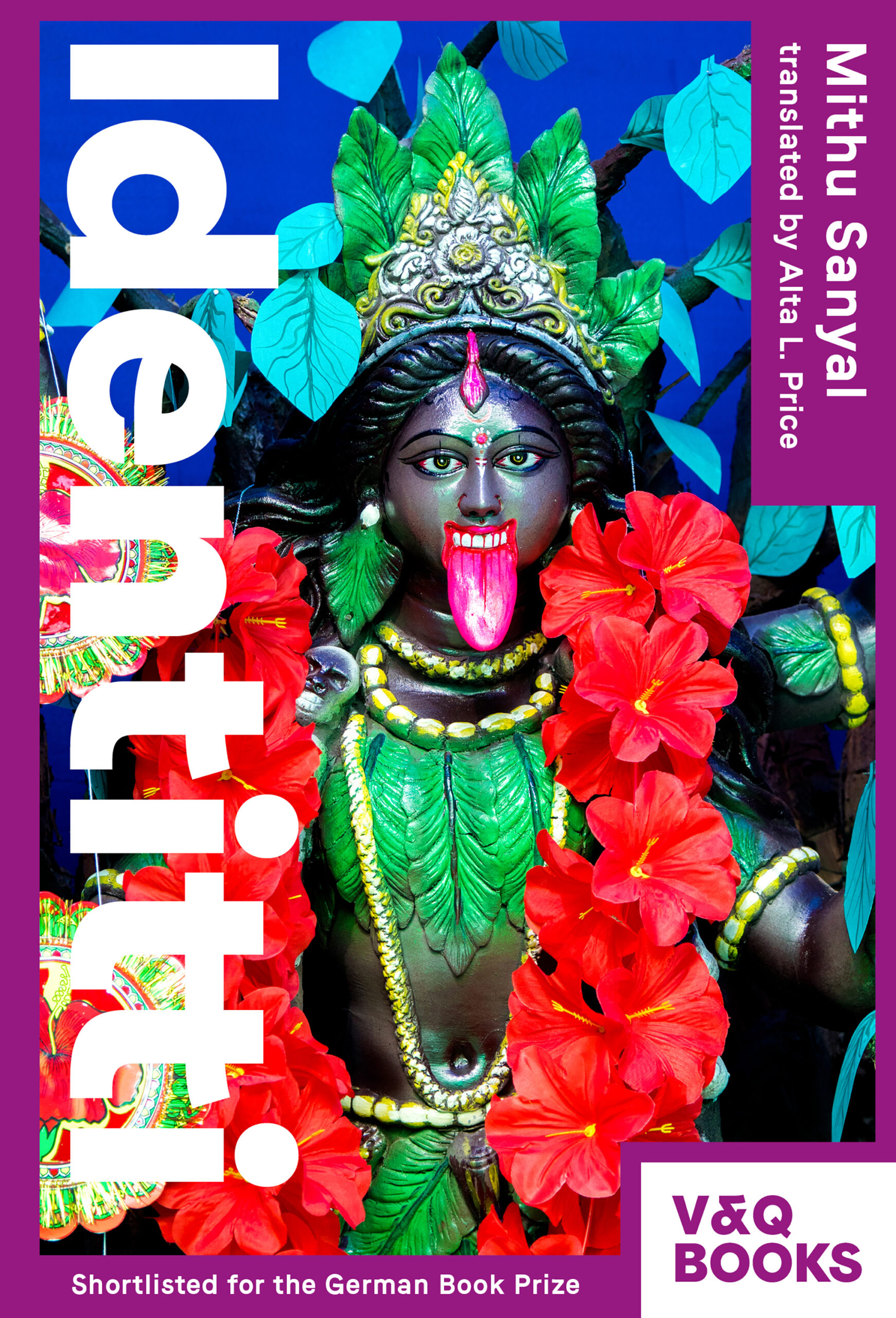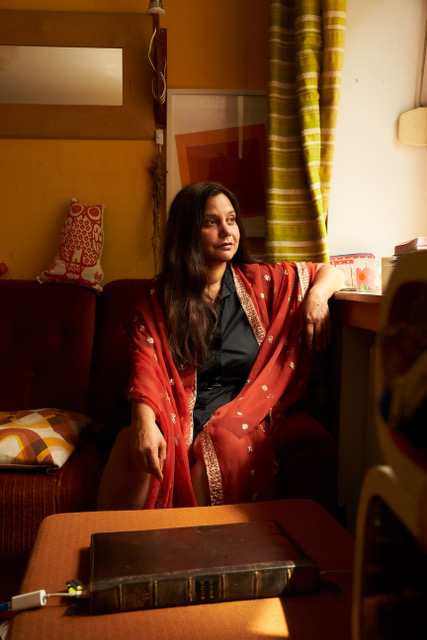


IDENTITTY
A blog by Pay-no-attention-to-that-person-behind-the-curtain!
About me:
After finishing this novel, I drank a cup of tulsi sweet rose tea – a herbal infusion, actually, since it didn’t include real tea leaves (Camellia sinensis). The front of the box told me it’s ‘Stress Relieving & Magical*,’ the left side said, ‘the fragrant essence of Rose Petals evokes the mysteries of India*,’ and the right side, under ‘other ingredients,’ listed ‘Organic Egyptian Rose Flavor.’ The asterisks indicate statements that ‘have not been evaluated by the FDA.’ The back of the box gave a caption for the image: ‘Pictured on the front is one of our beloved farmers or a family member.’ It’s from a company called Organic India. I want to ask Kali or Identitti/Nivedita or maybe even Mithu what Egyptian roses have to do with Indian mysteries, but then I see the main ingredients include tulsi a.k.a. holy basil (Ocimum sanctum) in both ‘Krishna & Rama varieties’, (you remember Rama, right?) so I decide to let it slide. Clearly neither the FDA nor the AfD have evaluated a single word of this book, either. Also, the person pictured on the front of the ‘tea’ box happens to look exactly like Saraswati … maybe? .
Then again, maybe not – we never did discover exactly what Saraswati looked like, did we? I hope that, by now, you’ve gone down all the rabbit holes with me. This entire book is mostly a transcript of the author’s novel, ‘just’ translated into English for your reading pleasure and/or displeasure. If you’ve read this far, you already know why I’m always talking to myself, the author, the editor, a few lawyers, and multiple goddesses in various languages, all while remaining totally invisible(ish). My name is Alta L. Price. You can call me IDENTITTY.
Meanwhile, out in the twitterverse:
- Average Joan @Anglosphear @Identitti thinks she can hide behind a new handle but now we all know who @Identitty is. #translationISappropriation #namethetranslator
- Don Meinmi @TraduttoreTraditore replying to @Anglosphear How do you know that’s not just a typo? Or autocorrect? #machinetranslation #humantranslationIsNotAThing
- Average Joan @Anglosphear replying to @Tradut- toreTraditore ‘cause it’s too clever by half. Transla- tors might be traitors, but they’re also detail-oriented reader-writers who dig into every discrepancy, lean into every doubt, and riff on every double-entendre. Also: this whole thing started with tits. #IdenTITTY #comefullcircle
- Don Meindmi @TraduttoreTraditore replying to @ Anglosphear OK, presuming you’re right, now we just really need to find out who @Identitty actually is… #takeresponsibility
- See Literary Critique @CLitCrit You’re all blind, guys. Or should I make that ADA-compliant? You’re all visually impaired, peeps. @Identitti is not the same as @Identitty: the former is a fictional blogger; the latter translated this fiction. #canturead
- Uncle Simon Says @USAy Another f’ing translation? What’s that even mean, anyway?
- Possible World @BetterWorld replying to @USAy Go learn German and all the other languages, why don’t you? Then you, too, can have echt experiences. #womenintranslation #necessaryevil
Full disclosure: Except for this postscript, Mithu Sanyal wrote every word of the novel you just read…
Mithu Sanyal wrote every word of the novel you just read, occasionally adapting quotes, tweets, speeches, and other statements originally made by various people in German and English and applying them to her fictional account. The only catch is that she wrote the book in German, and then I did my damnedest to bring all her German into English, which is obviously an impossibility. But it wasn’t even that simple, because her text was remarkably polyphonic, featuring German, English (i.e., British and Indian and North American Englishes), French-via- English-translation, and sprinklings of other languages, not to mention a whole lot of slang and other super-loaded language. Readers of the German edition could witness Priti’s evolving elocution as her English was supplanted by German – an amusing mix that couldn’t be translated ‘exactly’, as that would’ve had the exact opposite effect of the original. So, I struck as careful a balance as I could – lest the character who spoke the least German now appear to speak the most – and if the balance wasn’t successful, that’s on me. The evocative pun on Priti and Prithee, on the other hand – like so much of the humour in this book – is entirely the author’s brilliance.
I opted to restore French West Indian philosopher Frantz Fanon’s book title to its original language as a way of maintaining the ‘foreign’ flavour of the German edition, which featured that and other titles in English. I made dozens of other decisions following that same logic: where colonisation has occurred and capitalism has had its way, one should respect the highly human mess that results (e.g., notions like ‘French West Indian’). You’ll see names like Birmingham and Bombay alongside both Calcutta and Kolkata – Mithu and I went with Bombay not only because the name Mumbai has been so heavily politicised by Hindu nationalists, but also to preserve the alliteration.
I’ll give another example of how, in translation, every word is a decision. You might know Kurt Weill and Bertolt Brecht’s song ‘Mack the Knife’ as a ‘ballad’. However, while the German term Moritat can be ‘ballad’, it’s no mere Ballade or bland Volkslied – it’s a murder ballad. Duden’s etymological explanation is that Moritat was coined from repeated distortions of Mordtat, an ‘act of murder’ (and now you can see the connection with the TV show Tatort, too). Anyway, I initially had ‘As the balladeer in “Mack the Knife” once sang,’ but then followed a flash of inspiration and alliteration to end up with ‘As the minstrel in “Mack the Knife” once sang,’ nodding to the horrific tradition of minstrel shows and minstrelsy in the United States. Additionally, Brecht added the stanza Saraswati quotes in 1931, for the film version, so if he could rewrite things, why can’t we? I then proceeded to lose sleep over it: Would that make Saras- wati sound too outrageous? Would it overwrite the original with medieval or other inappropriate connotations? Was it too much of a displacement? Ultimately, as Tyehimba Jess suggested in Olio, I opted to let you, dear reader, ‘Weave your own chosen way between these voices.’ And in this particular case, ‘these voices’ include interpretations by Lotte Lenya, Frank Sinatra, Marc Blitzstein, Louis Armstrong, Bobby Darin, Turk Murphy, Domenico Modugno (in italiano), Ella Fitzgerald, Ute Lemper, Nina Hagen, Nick Cave, Sting (auf Deutsch, no less), Theo Bleckmann, and so many more – at least that’s some of the baggage we can safely presume you bring to this tiny detail of the book.
My main way of channelling the text involved going overboard and being reined back in, so I’m indebted to the author and editors for the open dialogue and their careful attention to detail and register, especially with the intriguingly inventive social media handles. Made-up social media handles that appear to refer to real people, inserting their statements into this fictional account, are marked by asterisks.
À propos of appropriation and adaptation, both the author and I took great liberties. Allow me to expand on just one such instance: in the German edition of this book, Jordan Peterson’s persona is inserted into an entirely made-up setting. The author watched videos of various public appearances he made over the years, extracted phrases here and there, and then combined them to compose fictionalised responses to the invented scenario of this novel – all in German, of course. Her German translation of these phrases had a certain flow that would have been lost had I transcribed, verbatim, the passages from his public lectures given in English. Therefore, I chose instead to be faithful to the way the author wove his actual spoken words into her fictional story. Similarly, the passage featuring Trump and Modi are based on (in)famous statements made by both of them. But if you still want to track down what everyone said, the sources are all laid out in the bibliography.
Now, let’s talk about sex: specifically, The Joy of Sex, a book by British physician author Alex Comfort first published in English in 1972. The scene where Priti reads from it was based on the German text, but English has an entire spectrum of terms beginning with n, from negro to the n-word, whereas German does not distinguish between them. This is important because writers like James Baldwin, also quoted herein, used both terms with extreme precision in English. I found it plausible that the 1972 edition used the former, but I had to eliminate all doubt as to whether it had used the latter. The argument could be made that it didn’t matter, since the characters were focused on the incendiary language in German, but I still needed to know. The matter was complicated by the fact that no fewer than five revised editions have since been published. The latest is ‘revised and updated for the 21st century’, which means (you guessed it) Oriental has become Eastern and all the titbits Priti and Nivedita marvel at have been excised – well, not all of them. The 1986 edition, heavily revised during the AIDS epidemic, still had what would’ve been the n-word in German, but the English edition had used a French term (I’ll let you do your own digging there, if you so desire). So, was it deemed not incendiary solely because it was in French? And would that have been because the editors didn’t know what it meant, or did know, but thought it was neutral? We’re left with a conundrum, but editorialising or speculating about things I can- not know is not my job; I partially unpack these quandaries here so you can appreciate the complexity of this novel, in whatever language you might read it.
I’ve observed a tendency – in the Anglophone world, at least – to lament what is purportedly lost in translation without acknowledging what is undeniably gained. There are many new voices in German that have yet to be heard, and my sense of urgency grew each time I saw people’s reactions when I told them I was translating a German satire about identity politics – the words German and identity produce so many presumptions, everywhere. And then I recalled how, two decades ago, many North Americans reacted to my study of German by asking why I wanted to learn the ‘ugly language of the Nazis’, instead of a ‘beautiful language, like French’ – as if French speakers had never committed any atrocities, or as if English speakers are somehow exempt from humankind’s unkind, highly fraught history … to not even touch upon what it means to read this book from within a culture where, every week, thousands of people experience some form of gun-related violence, and invariably under reported hate crimes are hard to quantify. So here we are. A little like the Wizard of Oz now peeking out – pay no attention to that person behind the curtain! – I remain fallible even as I strive to do this rich novel justice. It’s a story about so many forms of misunderstanding and injustice, but also love – so I tried to make it understandable, and maybe also misunderstandable, and hopefully also lovable. As Saraswati might say to Nivedita and her other seminar students, class: discuss. I can’t wait to hear what you think.